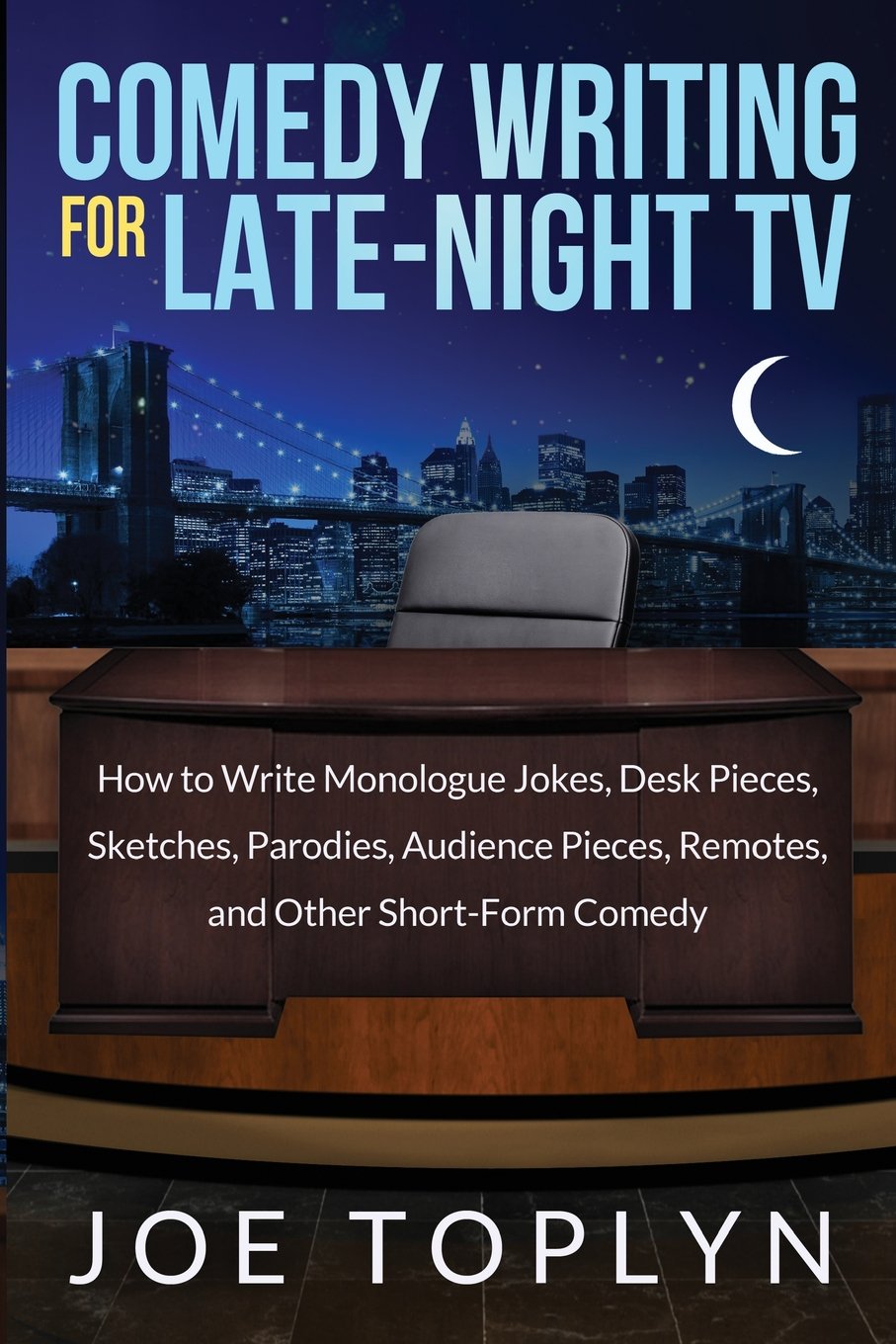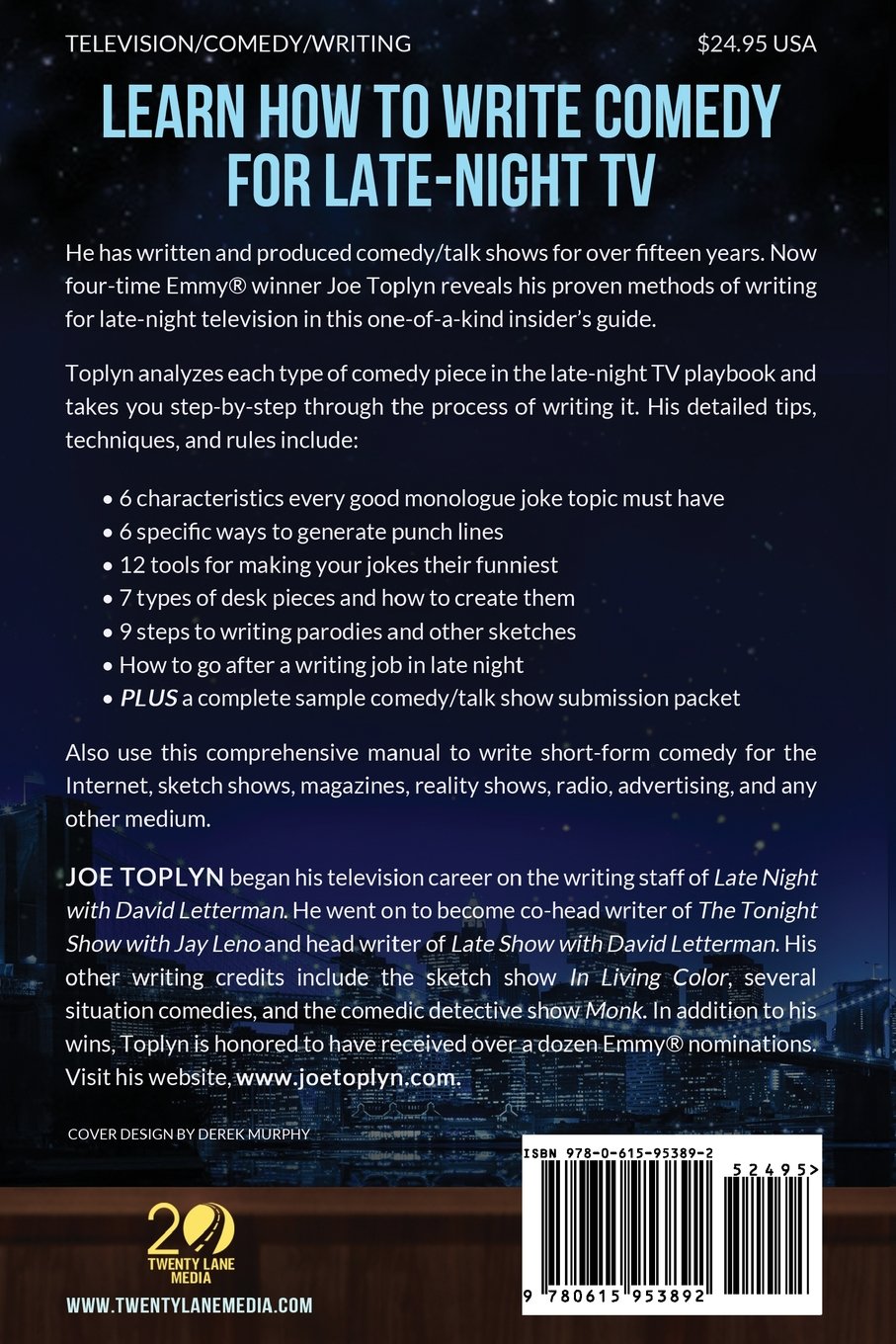Some deliveries may take a little longer than usual due to regional shipping conditions.
Servicios al cliente
Sobre nosotros
Copyright © 2025 Desertcart Holdings Limited



Comedy Writing for Late-Night TV: How to Write Monologue Jokes, Desk Pieces, Sketches, Parodies, Audience Pieces, Remotes, and Other Short-Form Comedy
J**K
Outstanding Comedy Writing Lessons Wait You.
I don’t believe you can learn to be funny. What you can learn, however, are methods to structure your funny. And that’s exactly what you learn from this book. So far I have only read as far as the chapter on monologue joke writing, but that’s because I am in post production on an indie feature I wrote and produced last year. And I wanted to write an original sitcom pilot I'd been meaning to write for a while. Oh, and I'm a stay at home dad to two kids. No biggie. But more about my film in a minute. Anyway, that chapter blew my head clean off with its clarity. I read it in bed, and I woke me wife up with my enthusiasm as I tried to explain my huge paradigm shift, but all she said was “that’s nice”.I have read 13 books and I have done 2 courses on stand-up comedy and comedy writing. I don’t think this puts me at a disadvantage with doing comedy, as some comedians think. I have worked as a stand-up, an MC, a sketch comedy writer and performer, and a joke writer. And been paid. I think you do what you can to model what has worked before.But the problem with a lot of books is they try to cover too much ground. They want to show you how to write jokes, monologues, stand-up, sketch, solo shows, sitcoms, and screenplays. There’s no way one 300 page book can cover all those. The best ones just focus on one area. That’s exactly what this book does.The section on monologue joke writing was the clearest explanation I have ever read. Typically, in other books that cover this, you get lessons on how to pick topics, generate ideas, but then you have figure out how to structure them yourself. You get something like “the punchline is your own reaction”. Huh? I have to make a sarcastic comment on what I’ve written. But not all comedy’s sarcastic, so then what do I do? Other times, the advice you follow allows you to write a joke for a comedian in 1983. But not now. This book explains how to write contemporary comedy.Also, you won’t learn exercises that exist by themselves as some comedy writing books have you do. These often leave you scratching your head as you try to figure out how to turn them into comedy material. With Joe’s book, you learn how to write usable comedy material from the get go.Yes, you will learn the formulas regularly used by late night comedy writers. They are used because of the sheer amount of work involved. You may also think, “this guy wrote for Leno? Urgh, Leno’s not funny.” You may substitute Letterman for Leno in that sentence depending on your preference. But you know, whatever you think of those guys and their late night perspectives remember in order to work as a writer on those shows, you have to be able to pump out 70-150 jokes (sometimes more) a day. A day.Some stand-ups write a couple of jokes a day for a year and have an hour long show at the end of it. And if that’s your goal, then great. But that many jokes will get you fired from your late night position.While volume may seem like a negative, the more you practice the lessons learned in this book, the more your quality level will increase.If you want to learn stand-up comedy writing, comedy screenplays, solo shows, or sitcom writing Joe’s book isn’t for you. Sure, the mechanics of laughter are the same, but with those different genres I just mentioned there are other things you need to learn.You will learn every facet of producing material for late-night, which not only includes monologue jokes, desk pieces, etc but sketch comedy too. So if sketch comedy is your thing, then you can certainly learn a lot about how to write sketch comedy from this masterful book.I mentioned earlier about being in post-production on my first screenplay. While I wrote that script before I bought Joe’s book, the techniques I have learned so far and will learn once I finish the book will help me on my next screenplay. The skills you learn are absolutely transferable, whether stand-up comedy is your ultimate goal or screenplays. The skills from this book can help you edit and hone your comedy in both stand-up and script writing.In case you’re wondering, I do not know Joe and I gain nothing from writing this lengthy testimonial. I refer to him by first name, because of the experience I have had in reading this book so far. It has made me feel like I am getting a personal tutorial. So I feel I can refer to him by his first name, even though I have never met him.Buy this book. More importantly, read and implement its lessons.
C**D
Great Guide for Comedy Creators and Fans of Late-Night
Comedy Writing for Late-Night TV delivers exactly what it claims to. It's a detailed production vocabulary for inventing/constructing/producing the full range of short-form comedy bits enjoyed for decades on late-night TV. The writing is very clear and full of useful tips, with plenty of actual examples including some I remember watching when they first aired. Guidance is present in large quantity: in paperback form, the book is far heavier than any of Shakespeare's plays. There are also practical pointers for developing a career in behind-the-scenes comedy.Beyond short-form comedy, the collected and organized recommendations are helpful for most any producing job. Entertainment of virtually every form can be 'spiced-up' with humor appropriate to the genre. How would you go about doing this if you're not naturally funny? This book can help you.As for drawbacks, some aspects of production flow are repeated, particularly those relating to editing and quality assessment. However this does reflect the general care and feeding needed to help comedy thrive regardless of its particular form. This book isn't just about making comedy. It's about making comedy that works well.This book might be for you even if you're not looking to produce comedy. Any fan of Late-Night (dozens in my neighborhood alone!) might appreciate re-living the history and the expected future from the perspective of the other side.
U**I
Authoritative book if you want to go into TV comedy writing
One of the best 3 books I've ever read on joke writing. But it's much more than that. IT goes into the details of all different forms of late night and TV sketch comedy writing and what it takes to employed as a pro comedy writer at networks. An eye opener. You learn that writing good jokes is just the beginning. The industry demands much more from writers than that, and this book tells it all with a great behind the scenes look at professional comedy writing.
M**E
Pretty straightfoward.
It really demystifies the whole monologue joke process. That seems like a simple and short review, but you'd be surprised what a lack of information there is in the world about proper joke writing from people who have actually done it.
W**G
Best book on writing for Late-Night TV
And the only book to cover that booming market.It used to be only Johnny Carson.Now TV has more late-night comedy shows than shows about cake.I'm Wayne Kline and like Joe, I've worked on Letterman and In Living Color and once was lucky enough to have Joe as the co-head writer on Leno.As you might expect from a double Harvard grad, Joe knows his stuff.He explains it well.Joe gives some cool creative tips.I like his 6 "Punch Line Makers," divergent thinking strategies of use for cranking out monologues or any kind of humor. Sitcoms. Screenplays. Drunk wedding toasts.Joe also breaks down in detail that comedy parts of late night shows I lumped into the category "non-monologue."The appendix is interesting too. Joe gives his backstage take on Jay vs Dave, turning the tide with help from Hugh Grant and his back seat romance, And of course OJ Simpson. Find out the one sketch that bombed.If you want a job in late-night TV and aren't currently related by blood to a host, this is the book for you.
Trustpilot
Hace 2 semanas
Hace 2 semanas